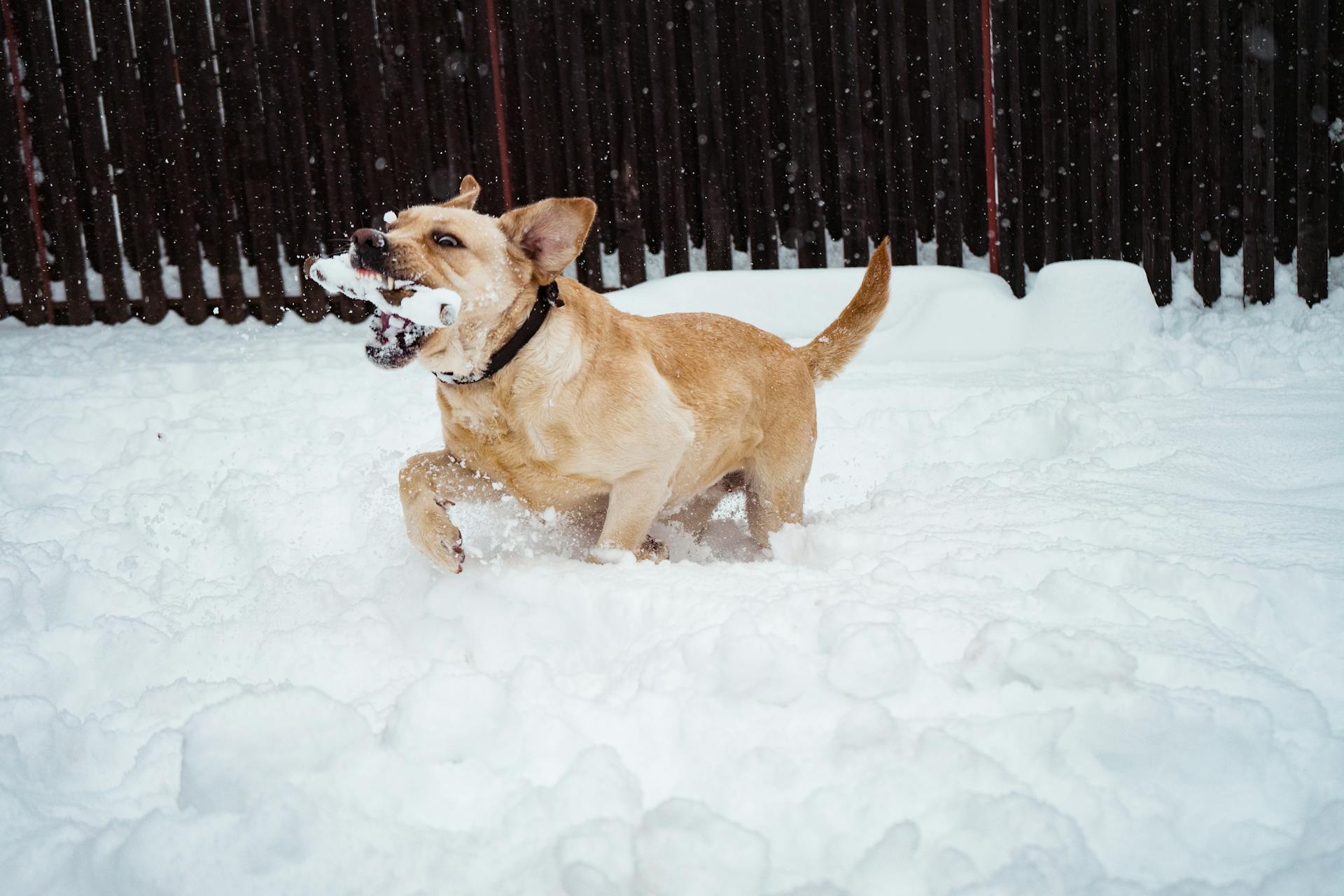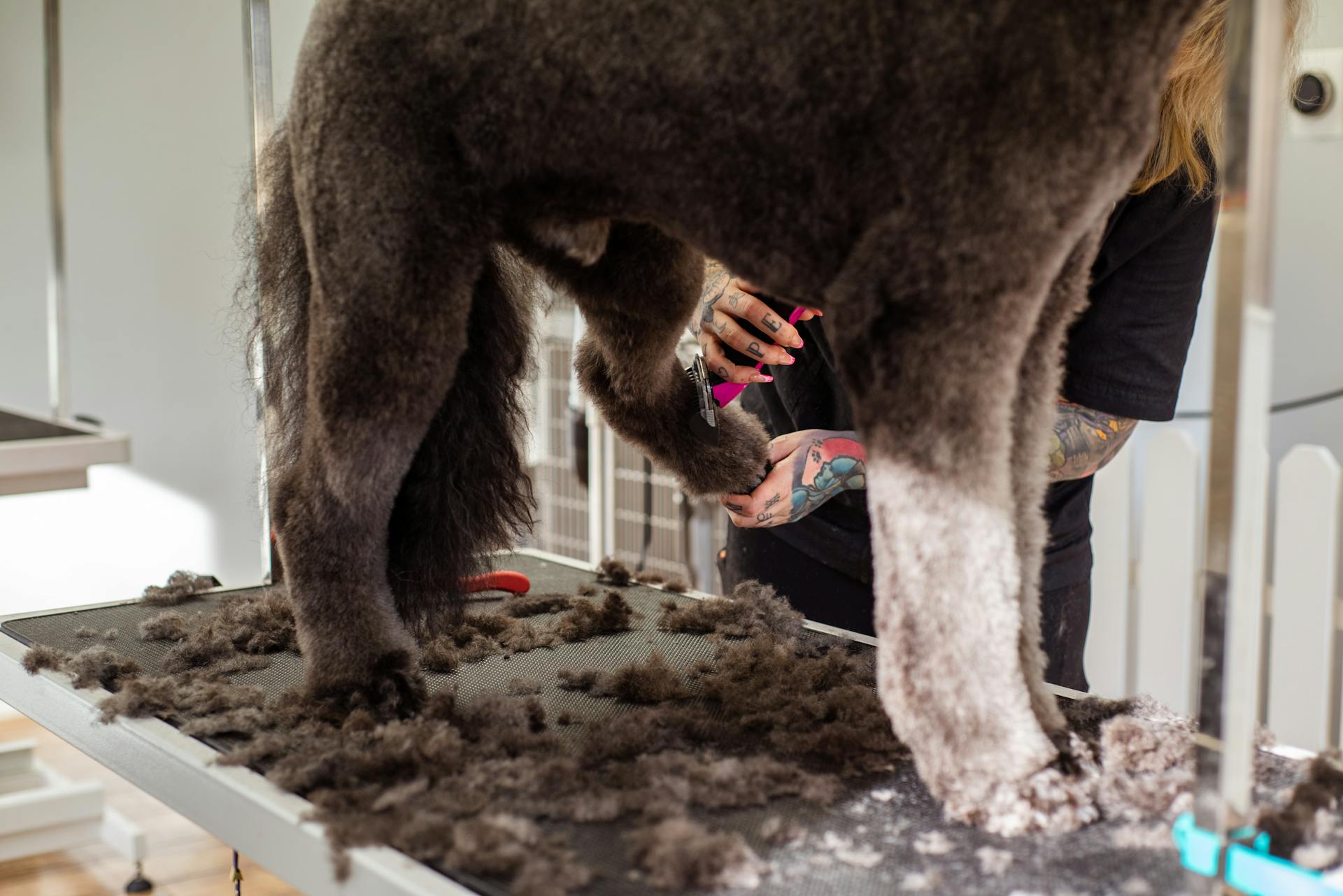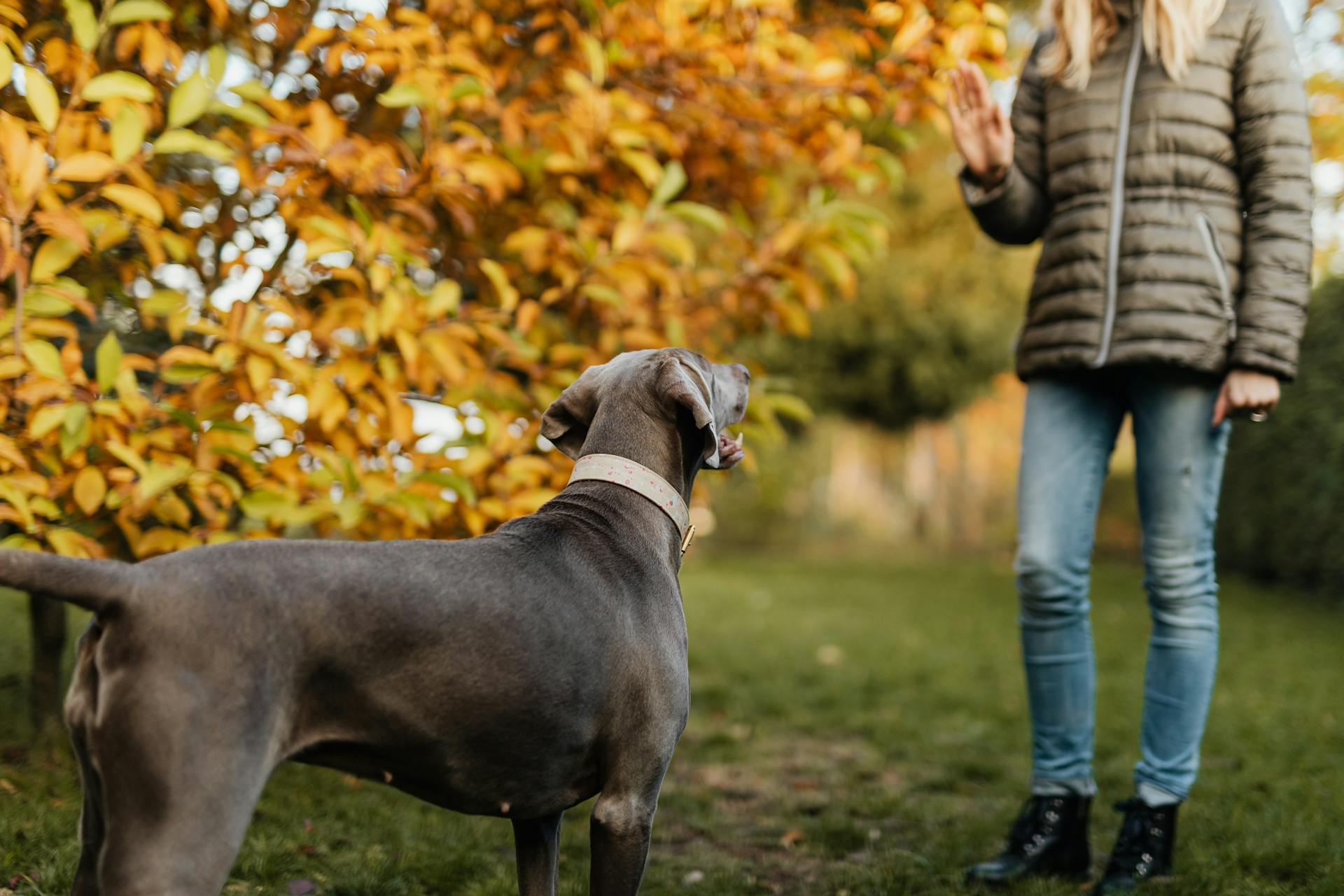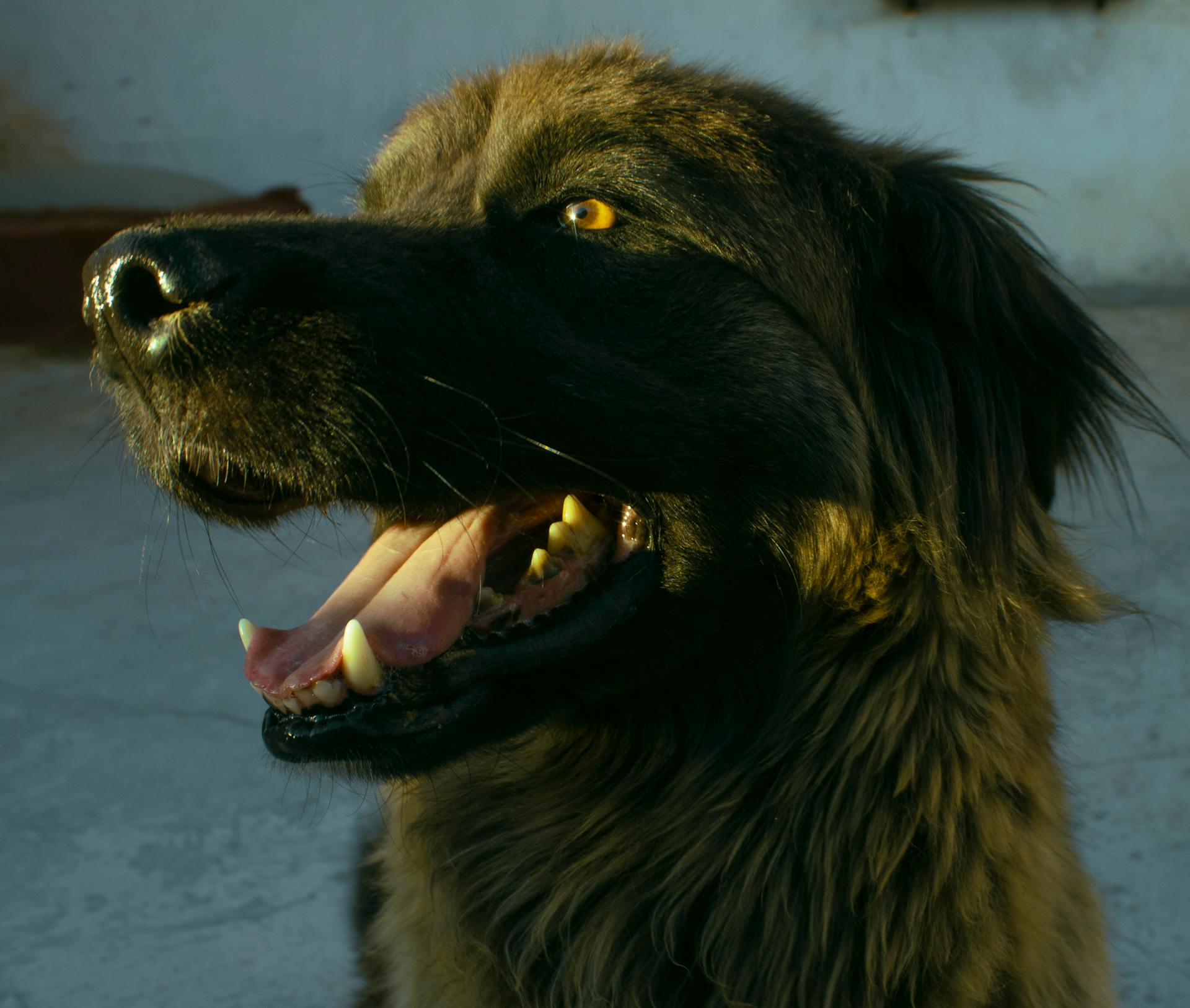
The Boerboel mix is a unique and intriguing breed, resulting from the cross between a Boerboel and another dog breed. They can inherit the Boerboel's impressive size, with males weighing up to 200 pounds.
One of the most notable characteristics of the Boerboel mix is their intelligence, which they inherit from their Boerboel parent. This intelligence makes them relatively easy to train, but also requires consistent and patient training.
Boerboel mixes are often described as loyal and protective of their families, much like their Boerboel parent. However, they can also be wary of strangers and may require time to warm up to new people.
They generally require a lot of exercise, but their exact needs depend on the specific breeds that make up the mix.
Physical Characteristics
The Boerboel mix is a unique and fascinating breed, and understanding their physical characteristics is key to appreciating their majesty. They typically stand between 23-28 inches tall at the shoulder.
Their size and weight can vary greatly, with some Boerboels weighing as much as 180 pounds. The average lifespan of a Boerboel is 10-12 years.
Boerboels have a broad head and jowly faces, typically with a black mask. Their short, dense coats come in a range of colors, from reddish-brown to cream and can be brindled (subtle tiger stripes). The Boerboel is the most agile of all the mastiff breeds, and they run with strength and purpose.
Their ears are medium-sized, V-shaped, and rounded at the tip, usually folding over and laying flat. Boerboels don't typically have cropped ears.
Here are some key physical characteristics of the Boerboel mix:
- Ears: Medium-sized, V-shaped, and rounded at the tip
- Eyes: Dark brown with an intelligent expression
- Nose: Broad muzzle and solid black nose
- Coat: Short, smooth, dense, and shiny
- Coat Color: Red, brown, reddish-brown, fawn, cream, or brindled (subtle tiger stripes)
- Tail: Straight, with the option to dock or undock
Temperament & Intelligence
The Boerboel mix is a loyal breed, bred to be a guard dog, and will put themselves in harm's way to keep their family safe. They're fiercely loyal to their loved ones, making them great family protectors.
These dogs are often described as being great playmates for kids, but it's essential to supervise interactions between children and powerful dogs like the Boerboel mix. They can misinterpret a friend's actions as a threat, so proper socialization and training are crucial.
Boerboel mixes are intelligent dogs that require a confident and calm owner to show them the ropes. They need a lot of mental and physical stimulation to prevent boredom and destructive behaviors.
With proper socialization, a Boerboel mix can thrive in a household with other dogs or cats, but they may do best as the only pet. They're wary of strangers and will not let someone they don't know into your home, so make sure to introduce new guests properly.
Boerboel mixes are strong-willed and independent, which can make training challenging. However, with positive reinforcement and consistent training, they can learn to be well-behaved and obedient.
A different take: Malamute Mixes
Health and Care
A Boerboel mix is a wonderful companion, but like all dogs, they can be prone to certain health issues. Joint dysplasia, eye problems, heart disease, ectropion, and entropion are just a few potential concerns.
It's essential to work with a reputable breeder who offers a health guarantee and is transparent about the breed's potential health problems. They should also provide health clearances for the parents of the puppy.
Regular exercise and a balanced diet can help prevent or manage some of these health issues. Plan on taking your Boerboel mix for extremely long walks and hikes to keep their energy level down. A tired dog is a happy dog!
Here are some common health issues that can affect Boerboel mixes:
- Hip Dysplasia: a condition where the hip joint is malformed, causing pain and discomfort.
- Elbow Dysplasia: similar to hip dysplasia, but affecting the elbow joint.
- Eyelid Issues: including ectropion and entropion, which can cause discomfort and vision problems.
- Dilated Cardiomyopathy (DCM): a genetic heart condition that can affect large or giant breed dogs.
By being aware of these potential health issues and taking steps to prevent or manage them, you can help your Boerboel mix live a long and happy life.
Health and Conditions
As a dog owner, it's essential to be aware of the potential health issues that can affect your Boerboel Neapolitan Mastiff Mix.
Joint problems are common in both breeds, so it's crucial to monitor your dog's joint health and watch for signs of joint dysplasia, which can cause limping or "bunny hopping."
Hip dysplasia is a condition where the hip joint is malformed and rubs, causing pain. Symptoms include limping or "bunny hopping", decreased activity, and difficulty getting up. Treatment ranges from weight management to physical therapy to surgery, depending on the severity.

Elbow dysplasia is similar to hip dysplasia, but it affects the elbow joint. Symptoms include limping or stiffness and swollen elbows. Surgery is most often recommended.
Eye problems are also a concern, with both breeds prone to eyelid issues like ectropion (eylids turning outward) and entropion (eyelids turning inward). Monitoring by your veterinarian and a visit to an ophthalmologist may be necessary if you notice any issues.
Heart disease is a genetic condition that can affect large or giant breed dogs, including your Boerboel Neapolitan Mastiff Mix. Dilated Cardiomyopathy (DCM) causes the heart to become enlarged, leading to a weakened heart muscle. Treatment typically involves medications.
Here's a list of potential health issues to watch out for:
- Hip dysplasia
- Elbow dysplasia
- Eyelid issues (ectropion and entropion)
- Dilated Cardiomyopathy (DCM)
- Coronary Heart Disease
- Brain Tumors
- Bone Cancer (Osteosarcoma)
Keep in mind that these health issues can be managed with proper care and attention from your veterinarian. Regular check-ups and monitoring can help catch any potential problems early on.
Care
Grooming needs for a Boerboel are relatively low maintenance, but they will still shed, so be prepared to invest in a good vacuum.

Baths should be given as needed, but not so frequently that you dry out their skin. This will help keep your floors clean and your dog healthy.
Plan on taking your Boerboel for extremely long walks and hikes to keep their high energy level down. This will prevent destructive behavior and keep them from getting bored.
A tired dog is a happy dog, and a tired dog is also a well-behaved dog. This is especially true for Boerboels, which have a strong prey drive and may try to run after small animals.
Breaking training sessions into shorter daily sessions will help keep their attention span higher and prevent frustration. This will also allow you to praise them when they do well, which is essential for positive reinforcement.
Proper socialization is crucial for all dogs, including Boerboels. Take your dog to the park and doggy daycare to get them around as many people and dogs as possible.
Grooming and Training
Grooming needs for your Boerboel mix are relatively minimal, but regular brushing is essential to manage shedding and keep the coat healthy and shiny. Brush your Boerboel mix once every week or two with a curry comb or soft grooming glove.
Ear cleaning is also crucial, check your pup's ears for debris and wax build up while brushing, and consult your vet if you notice anything unusual. If recommended, follow the step-by-step guide on how to clean dog ears.
Bathing needs vary, but your Boerboel mix typically requires a bath every four to six weeks unless they're super active or drooly. Nail trimming is best done during bath time when the nails are softer and easier to clip.
Training is essential for your Boerboel mix, and socialization starts at home. Enroll your pup in puppy preschool as early as 8-10 weeks old to help them play nicely with other puppies and meet new people.
Boerboels need consistency in training, use the same commands often and don't give them "days off" or free days when the rules don't apply. Positive reinforcement is the best training method, using praise, treats, and playtime to reward good behavior.
To keep your Boerboel mix's coat healthy and shiny, brush them once every week or two, and bathe them every four to six weeks. Here's a quick grooming schedule:
- Brushing: every week or two
- Bathing: every 4-6 weeks
- Nail trimming: during bath time
- Dental care: daily brushing with a toothpaste without xylitol
Grooming
Grooming is a crucial aspect of caring for your Boerboel. Your Boerboel's grooming needs are minimal, but regular grooming is essential to keep their coat healthy and shiny.
Brushing your Boerboel once every week or two with a curry comb or soft grooming glove can manage their shedding and keep their coat healthy and shiny. This will also help reduce how much your pup sheds.
Ear cleaning is also an essential part of grooming. Check your Boerboel's ears for debris and wax buildup while brushing their coat, and speak to your vet if you notice anything unusual.
Bathing your Boerboel is a relatively rare occurrence, but it's essential to do so about every four to six weeks, unless they've been super active or super drooly. You may want to keep a towel handy to spot clean them or your furniture.
Nail trimming is a great opportunity to check your Boerboel's nails, especially during bath time when the water makes them softer and easier to clip. You'll know it's time for a trim when you can hear your pup clacking on your kitchen floors.
Daily dental care is also crucial for your Boerboel's health. Brush their pearly whites daily, and get your puppy used to the habit while they're young. Don't forget to schedule an annual cleaning with your vet to remove tartar buildup.
Here's a quick rundown of grooming tips for your Boerboel:
- Brush their coat once every week or two
- Check their ears for debris and wax buildup
- Bathe them every four to six weeks
- Trim their nails regularly
- Brush their teeth daily
Remember, grooming is not just about physical appearance; it's also about maintaining your Boerboel's overall health and well-being.
Training
Training is essential for any dog, but especially for powerful breeds like the Boerboel.
Start socializing your puppy as early as 8-10 weeks old by taking them on walks and enrolling them in puppy preschool. This will help them get used to meeting new people and dogs.
Consistency is key when training a Boerboel, so use the same commands often and don't give them "days off" or free days when the rules don't apply. They need a confident and calm pup parent to guide them.
Positive reinforcement is the only training method you should use, as it avoids the risk of your pup becoming aggressive toward you. This method uses praise, treats, and playtime to reward good behavior.
Boerboels are powerful pups who'll test your leadership, so consider enrolling in obedience classes where they'll learn basic commands like sit, stay, and come.
Broaden your view: Boerboel Puppy
Food & Diet
Boerboel mixes, like any other dog, require a high-quality commercial dog food that matches their stage in life - puppy, adult, or senior. Choose a formula that meets the nutritional standards set by the Association of American Feed Control Officials.
As active dogs, Boerboels are prone to obesity, so be sure to count all the treats you give during training. It's essential to monitor their diet to prevent health problems.
For a balanced diet, consider adding fruits and vegetables to provide micronutrients like vitamins D and C. These help with digestion and mineral absorption.
A large portion of an adult Boerboel mix's diet should be meat, with organ meat being a rich source of fat-soluble vitamins and minerals. Organ meats are particularly nutritious.
Overfeeding is a common issue, and it can exacerbate health problems like elbow and hip dysplasia. Be mindful of your dog's treat intake and consider a Raw Food Diet for optimal nutrition.
Boerboel mixes need protein to build a robust muscular system, so ensure their diet includes a sufficient amount of protein. This is especially important during their growth phase.
A balanced diet is key to preventing chronic illnesses like cancer. Fruits and vegetables are great sources of antioxidants that help manage oxidative stress.
Breed Overview and Compatibility
The Boerboel mix is a strong and loyal breed that can make a great companion for the right owner. They typically weigh between 110-160 pounds.
They're naturally protective of their families and can be wary of unfamiliar faces, but with proper training and socialization, they can thrive as a family dog. They have a strong prey drive, which means they may not be the best fit for households with small pets.
These dogs are intelligent and easy to train, making them a great choice for experienced dog owners who can devote time to their daily exercise and mental stimulation needs. They can be gentle and calm, but also have a stubborn streak that may require extra effort to manage.
History
The Boerboel's history is a fascinating one, and it all began in South Africa in 1652 when Jan van Riebeeck brought a dog to the Cape.
This marked the start of a long line of large guard dogs that would eventually become the Boerboel breed. The Boers, Dutch, German, and Huguenot settlers, brought these dogs with them for protection and big-game hunting.
Over time, these dogs were bred with other bulldog and South African mastiff types, including the Bullmastiff, Rhodesian Ridgeback, English Bulldog, and the Khoikohoi or Khoisan dogs.
This breeding process resulted in the Boerboel dog we know today. The Boerboel breed's instincts led them to be excellent guard dogs, fending off wild animals and protecting diamond mines and farms from would-be thieves.
The American Kennel Club recognized the breed in 2014 and joined the Working group in 2015, which consists of dogs born to do a job, like guarding or search-and-rescue.
Breed Overview
The Rhodesian Boerboel and Cane Corso Boerboel mix are strong, gentle, and loyal breeds.
These dogs can grow up to 200 pounds and require regular exercise to stay happy and healthy.
They're naturally protective of their families, making them great watchdogs, but they need proper training and socialization to prevent aggression.
Rhodesian Ridgebacks and Boerboels are both South African working dog breeds, so their offspring are typically strong, active, and ready to jump into action when necessary.
Here's an interesting read: Maltipoo Mixed Breeds
The Cane Corso Boerboel mix is a natural-born leader with a strong instinct to protect and defend its family.
They're highly intelligent and easy to train, but they do require a firm hand from a young age to ensure they grow up to be well-balanced adults.
The Rhodesian Boerboel mix is a high-energy puppy that needs vigorous exercise requirements and can be rowdy and exuberant until they learn boundaries.
They're naturally wary of unfamiliar faces and pets, making them great watchdogs, but they need to be trained to be gentle around children.
Boerboels are short-haired, low-maintenance dogs, but they still require a lot of time spent in training and exercising to build a deep bond with their owners.
Pet Compatibility
When interacting with other pets, the Cane Corso Boerboel mix can be a bit of a challenge. They have a fairly high prey drive and will need a lot of training, dedication, and socialization to get along with cats and other small pets.
Their strong prey drive is inherited from their Rhodesian Ridgeback parent, which can make them a threat to smaller animals if not properly trained. However, with patience and consistency, they can learn to coexist with other pets.
In some cases, the Cane Corso Boerboel mix can get along well with other dogs and cats, especially if they were brought up together and have a similar temperament. But it's essential to remember that every dog is unique, and their behavior can vary greatly.
Their loyalty and protectiveness can make them excellent watchdogs, but this also means they may be wary of unfamiliar faces, strange pets, or anything that's just roaming around the vicinity. This can sometimes lead to a more independent nature, especially if the Boerboel genes are dominant.
As a result, it's crucial to introduce them to children at a very young age and train them to be gentle, as they can be great with kids if socialized properly.
Frequently Asked Questions
Is Boerboel a good dog?
Yes, Boerboels can make great family pets, but they require consistent training and socialization to thrive. With proper care, they can be loving, gentle, and fiercely loyal companions.
Sources
- https://shopforyourcause.com/dog-breed/boerboel/neapolitan-mastiff/mix
- https://be.chewy.com/dog-breed/boerboel/
- https://www.dogster.com/dog-breeds/rhodesian-boerboel-mix
- https://www.dogster.com/dog-breeds/cane-corso-boerboel-mix
- https://medium.com/@yourgiantdog/the-boerboel-rottweiler-mix-what-you-need-to-know-9290115dbcc1
Featured Images: pexels.com

